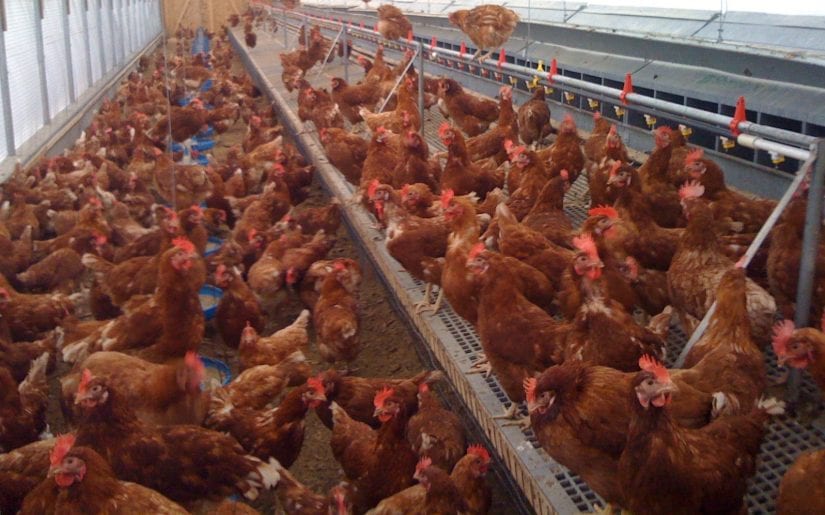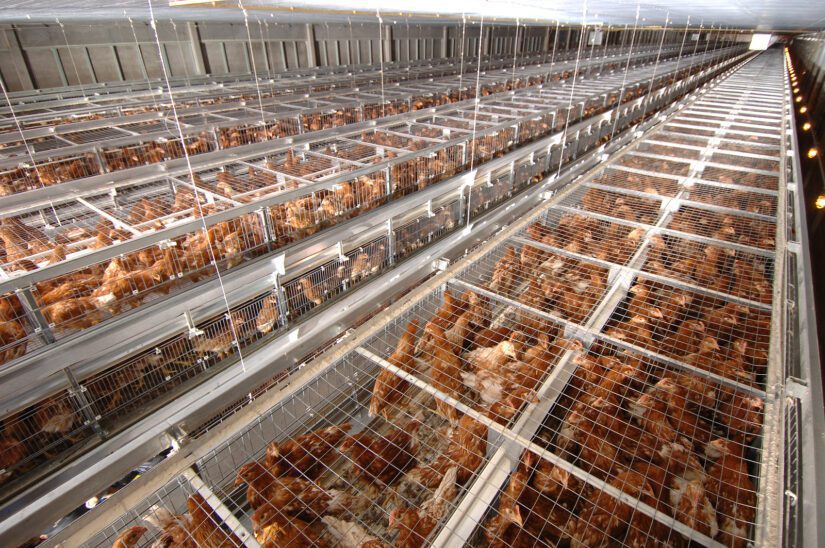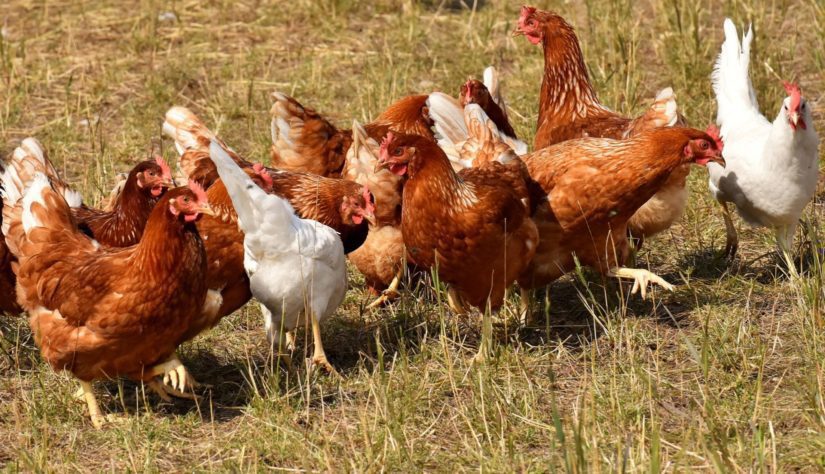About the industry
There are more than 1,200 egg farms across Canada, housing an estimated 25 million laying hens who produce more than nine billion eggs each year.
British Columbia has over three million laying hens on 145 farms. The average flock size in B.C. is 22,274 hens.

Life of laying hens
Chickens that are raised for egg production will go through four different stages: breeder farms, hatcheries, pullet farms and layer farms.
Breeder farm
Breeds of chickens are selected for characteristics that are good for egg production. Hens are kept with roosters who fertilize the eggs. The fertilized eggs are collected, cleaned and carefully stored, before being sent to a hatchery.
Hatchery
Fertilized eggs are placed in an incubator for 18 days, after which they are removed from the incubator and hatch three days later. Once hatched, the female chicks are vaccinated to protect them against disease. They may also have the tips of their upper beaks trimmed to prevent birds from hurting each other when stressed. They are then sent to a pullet farm. A pullet is a young hen that has not reached sexual maturity (started laying eggs).
Male chicks are euthanized at the hatchery as they do not produce eggs and do not grow fast enough to be a source of meat. New technology allows hatcheries to determine the sex of a chick before hatching in order to eliminate this practice, but is not yet widely used in Canada.
Pullet farm
At the pullet farm, the birds are cared for as they mature into laying hens. It takes 18 to 20 weeks for pullets to begin laying eggs. Most pullet farms use an “all-in, all-out” system – meaning that all birds arrive together and move to the laying farm together. This allows for the barn to be thoroughly cleaned and disinfected between each flock and reduces the chance of disease spread that can occur when mixing pullets from different farms.
Laying farm
Pullets are moved into laying barns a few weeks before they begin laying eggs, which gives them time to adapt to their new environment. Once the pullets begin laying eggs, they are called laying hens or layers. In a typical flock, laying hens reach peak production around 26 to 28 weeks of age, where they are laying approximately one egg per day. After 12 to 14 months of production, hens start to lay fewer eggs, so they are euthanized or sent for slaughter.
Unlike broiler chickens, which have been selectively bred to rapidly grow muscle, egg-laying hens have been bred to produce a large number eggs. As a result, older laying hens (called “spent hens”) have a much leaner body and very fragile bones. They often end up being used for soups, chicken fingers, or pet food.
Once all the birds have left, the barn will be cleaned and disinfected before a new flock arrives and the cycle repeats.
Get the full story about how egg-laying hens are raised in Canada. (PDF)
What are the main concerns for laying hen welfare?
Cages
There are many different housing systems for laying hens, but the most common in Canada and B.C. are conventional cages (also called battery cages). These are small cages each housing four to eight hens, that provide little space and resources for hens to perform their natural behaviours. Not having their physical and behavioural needs met can lead to frustration and suffering. 57% of laying hens in Canada and 50% of laying hens in B.C. are raised in conventional cages. Egg farmers in Canada have committed to transition away from conventional housing by 2036.

Many farmers are transitioning from conventional cages to enriched cages. These cages offer slightly more space to the birds, and provide additional resources such as perches, a nest box, and a scratch area. However, these cages are still very restrictive so the birds are not able to fully benefit from these enrichments.
Bone health
Due to the high demand placed on hens for egg production, osteoporosis (weak bones) and fractures are a major problem facing laying hens. Calcium is needed for daily eggshell production, but is also important for bone development. When birds are in lay, calcium is used to form the eggshell at the expense of being used to form strong structural bone. Over the course of their intense production, they lose bone strength and become prone to osteoporosis and bone fractures. These conditions cause pain and distress and inhibit their mobility. Hens are at a high risk of bone injury when handled at the end of the laying period in order to be transported to slaughter.
Feather pecking
Hens may peck and pull at the feathers of other hens, sometimes leading to serious injuries and even cannibalism. There are many factors that can lead to feather pecking, one of them being a lack of enrichment. Chickens perform many important natural behaviours that help them feel clean, safe, and comfortable in their environment – behaviours like perching, dust bathing, and finding a secluded nest to lay their eggs. If they are unable to perform these behaviours, birds may become bored, frustrated, stressed and aggressive, which can lead to feather pecking.
Beak trimming is routinely performed on hens to prevent damage if they begin pecking at each other. But if done incorrectly, it can cause lasting pain and distress for the hen.
Support a better life for egg-laying hens
By choosing higher-welfare food products, you can help laying hens lead better lives and support the farmers who care for them. Learn more about shopping for higher-welfare eggs.
We are always working to build a better future for farm animals in B.C. and across Canada, but we need your help. Help us speak for farm animals by taking action.

Additional resources
- Code of Practice for the Care and Handling of Pullets and Laying Hens
- Fun facts about chickens!
- Caring for backyard chickens
Subscribe to FarmSense
Are you passionate about farm animal welfare and want to help improve the lives of laying hens? use this form to sign up for our FarmSense e-newsletter and stay up-to-date on our initiatives!
The BC SPCA uses your personal information to update you on our work for animals as well as for advertising and analytics purposes. More information on uses and how to opt-out can be found in our Privacy Policy.
